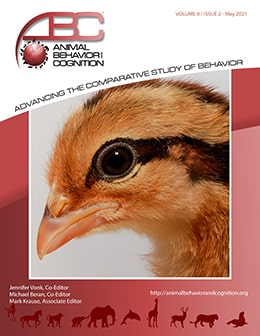Vol 8, Issue 2, May 2021
Replications, Comparisons, Sampling and the Problem of Representativeness in Animal Cognition Research
Citation
Farrar, B. G., Voudouris, K., & Clayton, N. S. (2021). Replications, comparisons, sampling and the problem of representativeness in animal cognition research. Animal Behavior and Cognition, 8(2), 273-295. https://doi.org/10.26451/abc.08.02.14.2021
Abstract
Animal cognition research often involves small and idiosyncratic samples. This can constrain the generalizability and replicability of a study’s results and prevent meaningful comparisons between samples. However, there is little consensus about what makes a strong replication or comparison in animal research. We apply a resampling definition of replication to answer these questions in Part 1 of this article, and, in Part 2, we focus on the problem of representativeness in animal research. Through a case study and a simulation study, we highlight how and when representativeness may be an issue in animal behavior and cognition research and show how the representativeness problems can be viewed through the lenses of, i) replicability, ii) generalizability and external validity, iii) pseudoreplication and, iv) theory testing. Next, we discuss when and how researchers can improve their ability to learn from small sample research through, i) increasing heterogeneity in experimental design, ii) increasing homogeneity in experimental design, and, iii) statistically modeling variation. Finally, we describe how the strongest solutions will vary depending on the goals and resources of individual research programs and discuss some barriers towards implementing them.
Keywords
Animal cognition, Comparison, Experimental design, Generalizability, Replication, Representativeness, Sampling
